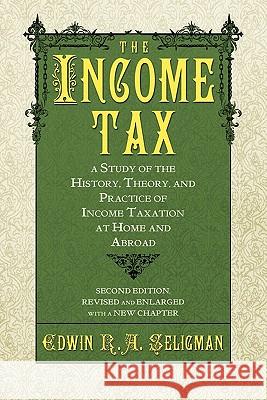The Income Tax: A Study of the History, Theory, and Practice of Income Taxation at Home and Abroad » książka
The Income Tax: A Study of the History, Theory, and Practice of Income Taxation at Home and Abroad
ISBN-13: 9781616191641 / Angielski / Miękka / 2011 / 764 str.
Originally published: New York: The Macmillan Company, 1914. xi, 743 pp. Reprint of the second edition, which includes a new chapter on the income tax of 1913. Seligman argues persuasively that graduated income taxes distribute the burden of taxation with greater justice than other systems. After he sets out the fundamental problem of the concept of income taxation, Seligman enhances his theoretical argument with a historical examination of income taxes in Europe and the United States. With a useful index and a thorough bibliography.
Edwin R.A. Seligman 1861-1939] was an eminent economist and authority on tax issues. He was admitted to the New York State bar in 1884 and in the same year received an appointment as lecturer in the political science department at Columbia University, where he later became a professor of political economy and finance. Seligman was a cofounder of the American Economic Association, serving as Its president from 1902-1904, and was later president of the National Tax Association (1913-1915). He served as an adviser to New York State and New York City tax commissions and acted as consultant to the League of Nations (1922-1923) and the government of Cuba in 1931. He was the editor in chief of the Encyclopedia of the Social Sciences and editor of the Columbia University series Studies in History, Economics and Public Law. He was the author of numerous titles on taxation and economics including The Shifting and Incidence of Taxation (1892; 3rd ed., 1910), Progressive Taxation in Theory and Practice (1894; 2nd ed. 1908), Economic Interpretation of History (1902; 2nd ed. 1907), Principles of Economics (1907), Studies in Public Finance (1925) and Essays in Economics (1925). "Professor Seligman's advocacy of the income tax in the various papers which were incorporated in this book] was an important factor in educating the American public to the point where the passage of the Sixteenth Amendment and of the law of 1913 was possible."--5 Columbia Law Review (1915) 292
Originally published: New York: The Macmillan Company, 1914. xi, 743 pp. Reprint of the second edition, which includes a new chapter on the income tax of 1913. Seligman argues persuasively that graduated income taxes distribute the burden of taxation with greater justice than other systems. After he sets out the fundamental problem of the concept of income taxation, Seligman enhances his theoretical argument with a historical examination of income taxes in Europe and the United States. With a useful index and a thorough bibliography.
Edwin R.A. Seligman [1861-1939] was an eminent economist and authority on tax issues. He was admitted to the New York State bar in 1884 and in the same year received an appointment as lecturer in the political science department at Columbia University, where he later became a professor of political economy and finance. Seligman was a cofounder of the American Economic Association, serving as Its president from 1902-1904, and was later president of the National Tax Association (1913-1915). He served as an adviser to New York State and New York City tax commissions and acted as consultant to the League of Nations (1922-1923) and the government of Cuba in 1931. He was the editor in chief of the Encyclopedia of the Social Sciences and editor of the Columbia University series Studies in History, Economics and Public Law. He was the author of numerous titles on taxation and economics including The Shifting and Incidence of Taxation (1892; 3rd ed., 1910), Progressive Taxation in Theory and Practice (1894; 2nd ed. 1908), Economic Interpretation of History (1902; 2nd ed. 1907), Principles of Economics (1907), Studies in Public Finance (1925) and Essays in Economics (1925).
"Professor Seligmans advocacy of the income tax in the various papers which were incorporated in [this book] was an important factor in educating the American public to the point where the passage of the Sixteenth Amendment and of the law of 1913 was possible."
--5 Columbia Law Review (1915) 292











